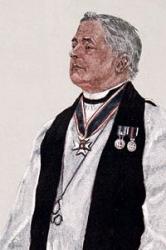Planning worship?
Check out our sister site, ZeteoSearch.org,
for 20+ additional resources related to your search.
- |
User Links
Search Results
[Lord, now lettest thou thy servant depart in peace]
Appears in 4 hymnals Composer and/or Arranger: Rev. F. A. J. Hervey, 1846-1910 Tune Key: E Flat Major Incipit: 34651 24321 Used With Text: Nunc Dimittis
[Lord, now lettest thou thy servant depart in peace]
Nunc Dimittis
Appears in 316 hymnals First Line: Lord, now lettest thou thy servant depart in peace Topics: Ancient Hymns and Canticles; God: His Attributes, Works and Word The Lord Jesus Christ - His Advent and Nativity; The Church The Sacraments - The Lord's Supper Scripture: Luke 2:29-32 Used With Tune: [Lord, now lettest thou thy servant depart in peace]
Nunc Dimittis
Magnificat
Appears in 90 hymnals First Line: My soul doth magnify the Lord: and my spirit hath rejoiced in God my Saviour Scripture: Luke 1:46 Used With Tune: [My soul doth magnify the Lord] (Hervey)
Magnificat
Diligam te, Domine
Appears in 10 hymnals First Line: I will love thee O Lord my strength the Lord is my stony rock and my defence Topics: The Psalms of David Day III - Evening Scripture: Psalm 18 Used With Tune: [I will love thee O Lord my strength the Lord is my stony rock and my defence]
Diligam te, Domine
Nunc Dimittis
Hymnal: The Book of Common Praise #C94 (1939) First Line: Lord, now lettest thou thy servant depart in peace Tune Title: [Lord, now lettest thou thy servant depart in peace]
Nunc Dimittis
Diligam te, Domine
Hymnal: The Church Service Book #136h (1906) First Line: I will love thee O Lord my strength the Lord is my stony rock and my defence Topics: The Psalms of David Day III - Evening Scripture: Psalm 18 Languages: English Tune Title: [I will love thee O Lord my strength the Lord is my stony rock and my defence]
Diligam te, Domine
Nunc Dimittis
Hymnal: The Book of Praise #825b (1918) First Line: Lord, now lettest thou thy servant depart in peace Topics: Ancient Hymns and Canticles; God: His Attributes, Works and Word The Lord Jesus Christ - His Advent and Nativity; The Church The Sacraments - The Lord's Supper Scripture: Luke 2:29-32 Languages: English Tune Title: [Lord, now lettest thou thy servant depart in peace]
Nunc Dimittis
Frederick A. J. Hervey

1846 - 1910 Person Name: Rev. F. A. J. Hervey, 1846-1910 Composer of "[Lord, now lettest thou thy servant depart in peace]" in The Book of Common Praise Born: May 18, 1846, Westminster, Middlesex, England.
Died: August 8, 1910, Norwich, England.
Buried: St. Mary Magdalene’s Church, Sandringham, Norfolk, England.
Son of Alfred, Lord Hervey, Frederick was educated at Marlborough and Trinity College, Cambridge (BA 1868, MA 1872). He was ordained a deacon in 1869, and priest in 1870. He served as Rector of Upton-Pyne, Devon (1876); Sandringham (1878-1907); Canon of Norwich (1897); and Domestic Chaplain to King Edward VII (1901).
--www.hymntime.com/tch/
Frederick A. J. Hervey


 My Starred Hymns
My Starred Hymns

